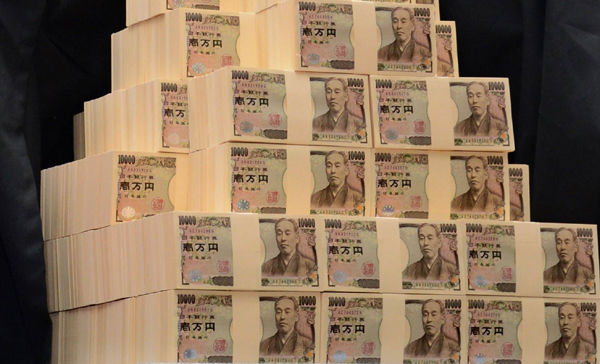Tuesday, 27 October 2015 12:05
 TOKYO: The yen rose in Asia on Tuesday ahead of a closely watched Bank of Japan policy meeting this week while traders bet the US Federal Reserve will delay an interest rate hike until early next year.
TOKYO: The yen rose in Asia on Tuesday ahead of a closely watched Bank of Japan policy meeting this week while traders bet the US Federal Reserve will delay an interest rate hike until early next year.
With the Japanese economy struggling to gain traction and inflation tepid, the BoJ is facing calls to ramp up its already vast bond-buying stimulus programme at the end of a two-day meeting Friday.
Adding to pressure on policymakers is China’s interest rate cut last week and hints from European Central Bank head Mario Draghi that it could widen its own stimulus in December
Tokyo launched embarked on its programme of easing in April 2013 and boosted it to a record 80 trillion yen in October last year as part of Prime Minister Shinzo Abe’s drive to kickstart the economy.
The meeting comes two days after the Fed’s closely watched meeting.
While the US central bank earlier this year said it expected to hike rates before 2016, summer turmoil in global markets and a growth slowdown in China have led its policy board to reconsider and speculation if rife that it will hold off until possible March.
“For markets to rally further we would probably need to see the Fed definitively push their first rate hike out into 2016… and the BoJ step up its monetary stimulus,” said Angus Nicholson of IG Ltd.
“Japanese markets could see a noticeable drop if BoJ refuses to act and the USD/JPY could push to 118 or even lower.”
In Tokyo, the greenback weakened sharply to 120.55 yen from 121.07 yen Monday in New York, while the euro was also down at 133.39 yen from 133.89 yen.
The euro rose to $ 1.1065 from $ 1.1059 on Monday in New York, although it still remains under pressure after Draghi’s comments last week.
Investors also tend to buy the yen as a safe-haven currency in times of uncertainty and turmoil.
“Markets remain cautious toward risk taking,” Yuji Saito, executive director of foreign exchange at Credit Agricole SA, told Bloomberg News.
“Investors are taking to the sidelines before the Fed and BoJ meeting.”
Emerging market currencies also benefited from expectations that US borrowing costs will remain low in the near term.
The Singapore dollar was 0.02 percent lower against the greenback, while the Malaysian ringgit shed 0.86 percent and the Thai baht slipped 0.12 percent.
However, the Australian dollar, South Korean won, Taiwan dollar, and the Indonesian rupiah all edged up against the dollar.
Emerging market units had been hammered this year on talk of a 2015 move as investors remove their cash to the United States in search of better, safer returns. But they have enjoyed a recovery this month talk of a delay has mounted.





























